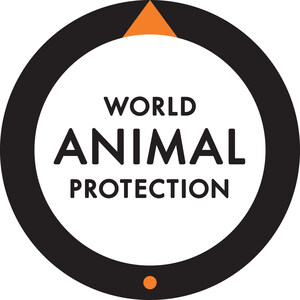NEW YORK, Aug. 20, 2020 /PRNewswire/ -- A group of advocacy organizations today urged Thomas Storch, White House senior trade advisor and G20 Sherpa, to support and champion a permanent ban on wild animal markets that could become sources for future pandemics. Additionally, the groups called on Storch to commit to ending international trade in wild animals and their products, at the upcoming G20 Leaders' Summit. The G20 Summit will occur in Riyadh, Saudi Arabia in November 2020.
The letter was sent by World Animal Protection, Center for Biological Diversity, Natural Resources Defense Council (NRDC), The Humane Society of the United States (HSUS), Animal Welfare Institute, People for the Ethical treatment of Animals (PETA), Harvard Animal Law & Policy Clinic, Compassion In World Farming, Animal Legal Defense Fund, Oceanic Preservation Society (OPS), International Marine Mammal Project of Earth Island Institute, Animals Are Sentient Beings, Unexpected Wildlife Refuge, Save Wolves Now Network, Endangered Habitats League, New Hampshire Audubon, Conservation Council of Hawaii, Brighter Green, Defenders of Wildlife, Animal Equality, and Humane Society Legislative Fund. Together, these organizations represent more than 10 million supporters across the United States.
COVID-19 has led to more than 20 million confirmed cases and 744,385 deaths across more than 200 countries and territories. According to calculations by the United Nations and others, the COVID-19 pandemic could cost the global economy between US $8.5 – 15.8 trillion and is triggering a global recession, forcing the introduction of costly stimulus packages.
"If we learn anything from this ongoing pandemic, it is that we need to leave wild animals where they belong, in the wild. We have an opportunity to help global leaders enact a change that could save the lives of millions of people, animals and our economies," said Ben Williamson, Programs Director, World Animal Protection, US.
It is widely acknowledged that a market in Wuhan, Hubei Province, China played a significant role in the COVID-19 outbreak. This market had a section which reportedly sold many live and dead wild animals including snakes, hedgehogs, crocodiles and raccoon dogs. Scientists are still investigating how the novel coronavirus (SARS-CoV-2) was transmitted to humans, but research suggests that the virus likely originated from bats and an intermediary host animal may or may not have been involved. This is not the first time that infectious zoonotic diseases have been linked to wild animals in recent years.
Wildlife trade has become big business, and the exploitation of wild animals puts our health, economies and biodiversity at risk. With the COVID-19 pandemic continuing across the globe, we can no longer ignore the dangers of exploiting wild animals. Wild animals are thought to be the source of at least 70% of all emerging zoonotic infectious diseases, meaning the demand for wild animals puts us all at risk.
"The demand for wildlife in G20 countries propels the global wildlife trade, spurs pandemics and fuels the extinction crisis" said Tanya Sanerib international legal director, Center for Biological Diversity. "The US consumes 20% of the global wildlife market. If the nation doesn't lead the G20's call to curtail wildlife trade and close live wild animal markets, we'll soon face the next outbreak of zoonotic disease."
In a recent *study conducted online by The Harris Poll on behalf of World Animal Protection, More than 3 in 5 Americans (62%) say they would support a permanent, global ban on the trade of wildlife, and 7 in 10 Americans (70%) would support closing down wildlife markets that sell wild animals for human consumption.
Background
This November, when the leaders of the G20 meet, efforts will be focused on dealing with the pandemic and coordinating a global response. The US' response must include a commitment to ending the global trade of wild animals forever.
During the 2008 financial crisis, the G20 showed its potential as a worldwide leadership body, agreeing to global solutions to stabilize the world's economies. It's time once again for the G20 to make a collective commitment and end the inter-country trade in wild animals and wild animal products.
The United States is one of the leading importers of wildlife, importing more than 224 million live animals and 883 million other wildlife specimens every year. It has the responsibility to take a leadership role in making sure the G20 acts to prevent future pandemics, by committing to end the international trade in wild animals and wild animal products.
*This survey was conducted online within the United States by The Harris Poll on behalf of World Animal Protection from July 7-9, 2020 among 2,022 US adults ages 18 and older. This online survey is not based on a probability sample and therefore no estimate of theoretical sampling error can be calculated. For complete survey methodology, including weighting variables and subgroup sample sizes, please contact Nicole Barrantes at [email protected]
About World Animal Protection
World Animal Protection has moved the world to protect animals for more than 50 years. World Animal Protection works to give animals a better life. The organization's activities include working with companies to ensure high standards of welfare for the animals in their care; working with governments and other stakeholders to prevent wild animals being cruelly traded, trapped or killed; and saving the lives of animals and the livelihoods of the people who depend on them in disaster situations.
World Animal Protection influences decision-makers to put animal welfare on the global agenda and inspires people to change animals' lives for the better. More information on World Animal Protection can be found at: http://www.worldanimalprotection.us/
Note to editors:
For more information please visit
- https://www.worldanimalprotection.us/ban-global-trade-wild-animals
- https://www.biologicaldiversity.org/
- https://www.nrdc.org/
- https://www.humanesociety.org/
- https://awionline.org/
- https://www.peta.org/
- https://animal.law.harvard.edu/
- https://www.ciwf.com/
- https://aldf.org/
- https://www.opsociety.org/
- http://savedolphins.eii.org/
- http://www.animalsaresentientbeings.org/
- http://www.unexpectedwildliferefuge.org/
- http://savewolvesnow.com/
- https://www.ehleague.org/
- https://www.nhaudubon.org/
- https://www.conservehawaii.org/
- https://brightergreen.org/
- https://defenders.org/
- https://animalequality.org/
- https://hslf.org/
SOURCE World Animal Protection

WANT YOUR COMPANY'S NEWS FEATURED ON PRNEWSWIRE.COM?
Newsrooms &
Influencers
Digital Media
Outlets
Journalists
Opted In




Share this article